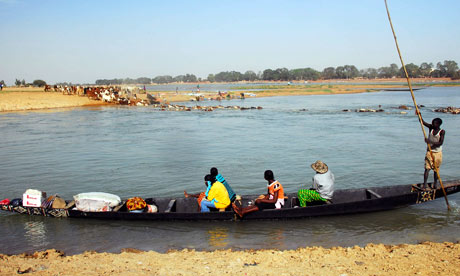Foreign investors aren’t just after land in Africa. Access to water is essential – which can bring them into direct competition with the needs of local communities.

Passengers in a pirogue watch Fulani herders cross the Niger River with their cattle on the outskirts of Mopti, Mali. Photograph: Florin Iorganda/Reuters
Claire Provost, Thursday 24 November 2011 (The Guardian, http://www.guardian.co.uk/global-development/poverty-matters/2011/nov/24/africa-water-grab-land-rights?CMP=twt_gu)
The banks of the Niger River, in southern Mali, have been flooded by a steady stream of foreigners. Coveted by foreign investors eager to snap up large tracts of fertile farmland, the river basin has been at the centre of a race to get hold of African land at rock-bottom prices. Meanwhile, last week, hundreds of smallholder farmers and civil society activists flocked to the same river basin for the first international conference to tackle the global rush for land.
West Africa’s largest river, the Niger is thought to sustain over 100 million people as it snakes 4,180km through Guinea, Mali and Niger before emptying into Nigeria’s colossal Niger Delta. In Mali, the Office du Niger is home to the vast majority of the country’s large scale land deals, seen by campaigners as emblematic of the “land grabs” taking place in developing countries. Recent estimates suggest that foreign investment in Mali’s limited arable land jumped by 60% between 2009 and 2010. But the potential knock-on effects of these land deals on local communities’ access to water has rarely made it centre-stage.
Ongoing research from the London-based International Institute for Environment and Development seeks to redress this blindspot, honing in on how such land deals might affect water access for fishing, farming and pastoralist communities. In a policy paper out on Thursday, the IIED’s Jamie Skinner and Lorenzo Cotula warn that an alarming number of African governments seem to be signing away water rights for decades, with major implications for local communities.
Investors in farmland are, understandably, after land with high growing potential – either land with lots of rainfall or land that can be irrigated. What Skinner and Cotula note is a worrying trend where governments are being rushed into signing away water rights during negotiations where they were initially only considering leasing land.
In many cases, say Skinner and Cotula, governments seem willing to simply provide water free of charge. In Mali and Sudan, for example, some investors have been given unrestricted access to as much water as they need. In other cases, where investors must pay to use water, they are often charged according to how much land is irrigated rather than how much water is used.
The role water plays in fuelling the global rush for land has received significant attention. It is no coincidence, observers say, that the most aggressive foreign investors are also those facing water shortages at home. This year, risk analysis firm Maplecroft said the results from its water stress index showed why India, South Korea and China, along with the oil rich Gulf states, are racing to buy land in developing countries and grow crops abroad. The chairman and former CEO of Nestlé, Peter Brabeck-Letmathe, has gone so far as to say the global rush for farmland is actually a “great water grab”. He writes in Foreign Policy: “With the land comes the right to withdraw the water linked to it, in most countries essentially a freebie that increasingly could be the most valuable part of the deal.”
But the effect of these deals on local communities’ water access has been a black hole in the debate around land grabs. And it is a severe omission, according to Skinner and Cotula, who stress how long-term contractural commitments with investors can jeopardise water access not only for those living near the agricultural investments but also for those living downstream. “When land is assigned to private investors, the deal only impacts directly on existing users of that land,” they explain. “Allocating water to irrigated agriculture potentially affects a much broader range of users.”
A 2011 report from researchers at the University of Manchester highlights similar concerns: “Impacts are likely to be far more extensive than might be anticipated from the area of land occupied … restriction or interruption of flows of water in an area occupied in one part of the landscape will have potentially widespread downstream impacts.”
According to the IIED paper, in some cases estimates of potential water requirements have run so large that major dam projects are being considered to ensure supply. The controversial Gibe III dam in Ethiopia, for example, will help irrigate 150,000 hectares that the government has allocated to investors. A report published by the African Development Bank says the project could lower the water level of Kenya’s Lake Turkana, on which around half a million people depend, by eight metres by 2024.
In an earlier review of land deal contracts, Cotula noted that leases in semi-arid countries would be worthless to investors without access to sufficient water for agricultural use. But just as land without water may be useless to agricultural investors, the same goes for local communities. Will future water conflicts be triggered by the downstream effect of today’s land grabs in Africa? Land, it seems, is only a small part of the land grab equation.
